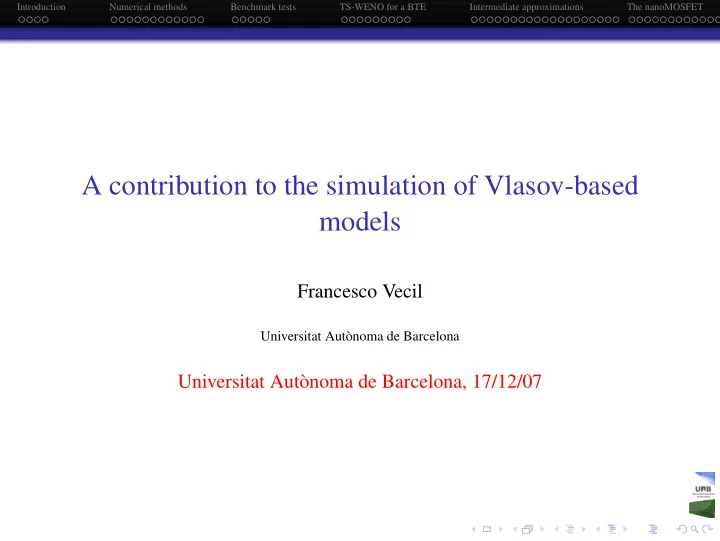

Introduction Numerical methods Benchmark tests TS-WENO for a BTE Intermediate approximations The nanoMOSFET A contribution to the simulation of Vlasov-based models Francesco Vecil Universitat Autònoma de Barcelona Universitat Autònoma de Barcelona, 17/12/07
Introduction Numerical methods Benchmark tests TS-WENO for a BTE Intermediate approximations The nanoMOSFET Outline Introduction 1 Introduction Numerical methods 2 PWENO interpolations Splitting techniques Linear advection Benchmark tests 3 Vlasov with confining potential Vlasov-Poisson 4 TS-WENO for a BTE Overview Numerics Experiments 5 Intermediate approximations Motivations Asymptotic-preserving schemes Experiments 6 The nanoMOSFET The model Numerical methods for the Schrödinger-Poisson block Experiments
Introduction Numerical methods Benchmark tests TS-WENO for a BTE Intermediate approximations The nanoMOSFET Introduction Outline Introduction 1 Introduction Numerical methods 2 PWENO interpolations Splitting techniques Linear advection Benchmark tests 3 Vlasov with confining potential Vlasov-Poisson 4 TS-WENO for a BTE Overview Numerics Experiments 5 Intermediate approximations Motivations Asymptotic-preserving schemes Experiments 6 The nanoMOSFET The model Numerical methods for the Schrödinger-Poisson block Experiments
Introduction Numerical methods Benchmark tests TS-WENO for a BTE Intermediate approximations The nanoMOSFET Introduction Objects of the simulations The goal of this work is a contribution to the numerical simulation of kinetic models for electronic engineering and plasma physics. Plasmas are ionized gases: positive, negative and neutral charges dissociate. Electronic devices are physical solid state devices, like semiconductors, which exploit the electronic properties of semiconductor materials (e. g. silicon) by manipulating their conductivity via the doping . � � � � gate � � � � � � � � ������������������������ ������������������������ ��������������� ��������������� ������������������������ � � ������������������������ ����������� ����������� � � ����������� ����������� � � ����������� ����������� � � ����������� ����������� � � ����������� ����������� � � ����������� ����������� drain source channel � � ����������� ����������� � � ����������� ����������� � � ����������� ����������� � � ����������� ����������� � � ����������� ����������� � � ������������������������ ������������������������ ����������� ����������� � � ������������������������ ������������������������ � � ������������������������ ������������������������ ��������������� ��������������� � � � � � � gate � � � � � � SiO layers 2 Figure: A M etal O xide S emiconductor F ield E ffect T ransistor.
Introduction Numerical methods Benchmark tests TS-WENO for a BTE Intermediate approximations The nanoMOSFET Introduction Objects of the simulations The goal of this work is a contribution to the numerical simulation of kinetic models for electronic engineering and plasma physics. Plasmas are ionized gases: positive, negative and neutral charges dissociate. Electronic devices are physical solid state devices, like semiconductors, which exploit the electronic properties of semiconductor materials (e. g. silicon) by manipulating their conductivity via the doping . � � � � gate � � � � � � � � ������������������������ ������������������������ ��������������� ��������������� ������������������������ � � ������������������������ ����������� ����������� � � ����������� ����������� � � ����������� ����������� � � ����������� ����������� � � ����������� ����������� � � ����������� ����������� drain source channel � � ����������� ����������� � � ����������� ����������� � � ����������� ����������� � � ����������� ����������� � � ����������� ����������� � � ������������������������ ������������������������ ����������� ����������� � � ������������������������ ������������������������ � � ������������������������ ������������������������ ��������������� ��������������� � � � � � � gate � � � � � � SiO layers 2 Figure: A M etal O xide S emiconductor F ield E ffect T ransistor.
Introduction Numerical methods Benchmark tests TS-WENO for a BTE Intermediate approximations The nanoMOSFET Introduction Objects of the simulations The goal of this work is a contribution to the numerical simulation of kinetic models for electronic engineering and plasma physics. Plasmas are ionized gases: positive, negative and neutral charges dissociate. Electronic devices are physical solid state devices, like semiconductors, which exploit the electronic properties of semiconductor materials (e. g. silicon) by manipulating their conductivity via the doping . � � � � gate � � � � � � � � ������������������������ ������������������������ ��������������� ��������������� ������������������������ � � ������������������������ ����������� ����������� � � ����������� ����������� � � ����������� ����������� � � ����������� ����������� � � ����������� ����������� � � ����������� ����������� drain source channel � � ����������� ����������� � � ����������� ����������� � � ����������� ����������� � � ����������� ����������� � � ����������� ����������� � � ������������������������ ������������������������ ����������� ����������� � � ������������������������ ������������������������ � � ������������������������ ������������������������ ��������������� ��������������� � � � � � � gate � � � � � � SiO layers 2 Figure: A M etal O xide S emiconductor F ield E ffect T ransistor.
Recommend
More recommend